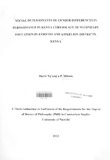| dc.description.abstract | This study aimed at finding out the social determinants of gender differences in KCSE performance in Kericho and Kipkelion Districts, Kenya. The study sought to explore the influence of the different male and female students' school and societal socialisation experiences on their academic performance. The study used descriptive research design and two questionnaires for data collection. The reliability of the data collection instruments was 0.81 for the students' questionnaire and 0.76 for the teachers' questionnaire. Descriptive statistics was used in data analysis.
The major findings of the study were that gender stereotypes, peer group culture and family socialisation were the most significant determinants of gender differences in academic performance. The study also found out that the type of school attended affected students' academic performance as only 8.1 percent of the female respondents managed to get grade C+ and above from mixed schools, and 31.4 percent of girls were from girls' single sex schools. Patriarchy was also found to have an influence on gender difference in KCSE performance as majority of the respondents at 67.5 percent attributed girls' poor performance to patriarchal socialisation which encouraged boys to academic superiority. Social classroom interaction was also found to affect male and female students' academic performance as majority of the respondents indicated that during these interactions, girls were socialized into believing in male students' academic superiority.
The study's major recommendations were that the Ministry of Education and all the stakeholders should encourage the introduction of more single sex schools and a mechanism should be put in place to phase out mixed sex schools since they limited male and female students potential academically. The Kenya Institute of Education (KlE) should initiate a revised curriculum that incorporates a subject on gender studies in secondary schools. The Ministry of Education should also put proper structures in place to implement various government policies on gender, which have largely not been implemented. School Boards of Governors (BOGs), Parents Teachers Associations (PT As) and community leaders should always give priority to gender issues in their school meetings. The Ministry of Education should also fully implement the program of re-inducting the teachers who are already in the field in order to reduce gender differences in academic performance. | en_US |

